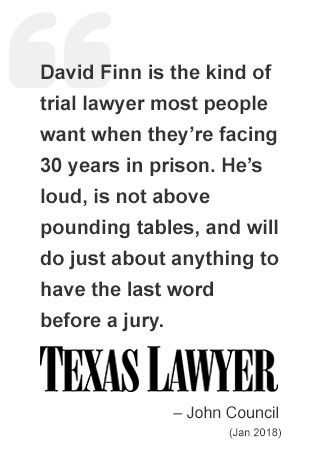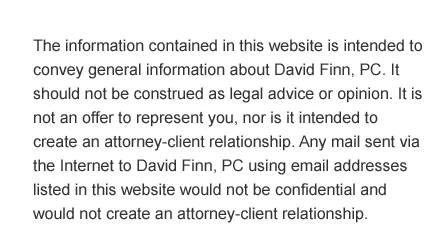


Defending Federal Conspiracy Charges in Texas
The law defines conspiracy as an agreement between two or more persons to work together to commit an unlawful or criminal act in violation of federal laws.
Simply stated, it is an agreement between two or more individuals to commit a crime.
The federal conspiracy statute – 18 U.S. Code § 371 – makes it a crime for anyone to engage in a conspiracy. Conspiracy charges can be prosecuted in federal courts and most state courts. In a conspiracy case, the defense attorney usually calls into question whether there was an actual conspiracy and whether the accused person was a part of that conspiracy.
What is the penalty for conspiracy?
All conspiracy charges carry a maximum fine of $250,000 for an individual or up to
$500,000 for an organization. What’s more, conspiracy charges are often grounds for a restitution order or forfeiture order. Different conspiracy statutes under federal laws forbid persons to take part in specific forms of unlawful activities which include:
- Racketeering conspiracies which are subject to the same punishments as underlying anti-racketeering law
- Terrorist conspiracies which are subject to the same punishments as underlying terrorist charge
- Drug dealing conspiracies which are subject to the same punishments as underlying drug dealing charge
- Conspiracy to commit other federal crimes which, under 18 U.S.C. 371, is punishable with prison time of up to five years
What is necessary to charge someone with the crime of conspiracy?
Along with asking someone to commit a crime (solicitation) and the actual attempt to commit a crime, conspiracy is one of those referred to as inchoate or incomplete crimes. An individual can be accused and convicted of an inchoate crime even if no completed offense ever occurs.
What the prosecutor must prove
To convict the accused of criminal conspiracy, the prosecutor must prove beyond reasonable doubt that:
- The accused made an agreement with one or more persons (conspirators) to commit the crime they are charged with
- The accused was aware of the agreement’s unlawful purpose but willingly entered into it
- One of the conspirators intentionally committed at least one overt act to move the purpose or objective of the conspiracy forward.
However, it does not always have to be two true conspirators. In a sting operation, even if the accused made an “agreement” with an undercover law officer to commit a crime, the accused may still be guilty of conspiracy.
The agreement may be clearly stated. Most agreements to commit crimes, however, are implied or unspoken and must be proved through circumstantial evidence. Since conspiracy laws punish conspirators for their plans, instead of their actual commission of the crime, there is in most cases (although not always) the condition that a conspirator commit an overt act. An overt act is any conduct or behavior, whether criminal or not, that moves the conspiracy plan forward or “gets the fire started.”
How much jail time do you get for conspiracy?
The Texas criminal code categorizes conspiracy as a “preparatory offense,” which means it is a crime linked with planning in contrast with execution. Some common examples of federal conspiracy crimes include:
- Two or more persons trying to defraud the United States
- Two or more persons plotting to commit a crime against the United States
- Two or more persons plotting to acquire, manufacture, or distribute illegal drugs or substances
Conspiracy charges carry a prison term of up to five years in prison. Some conspiracy offenses are subject to harsher punishment, such as the conspiracy to distribute drugs.
What sentence do you get for conspiracy?
Conspiracy is a crime in itself and subject to criminal punishments. This means that if the conspirators plotted a crime and actually commit it, they can be penalized for both conspiracy and the crime committed.
Different states have their own punishment for conspiracy. In most states, however, persons who commit conspiracy can be punished with the same sentence as if they had committed the actual crime. For instance, if armed robbery carries a 10 to 25 year prison term, then conspiracy to commit armed robbery can likewise get a jail term of 10 to 25 years. Needless to say, if the accused is convicted of both conspiracy and armed robbery, they could possibly be sentenced to 20 to 50 years in prison.
Look for an experienced federal conspiracy defense lawyer
Minor participants will often get implicated during the investigation process of a crime. Retaining a federal conspiracy defense lawyer early in the investigation, particularly for federal conspiracy charges in fraud, white collar, or drug crime cases, is recommended to get the best result.
Conspiracy convictions are punishable with expensive fines and long prison sentences. A lawyer can advise you of the possible consequences of a conviction based on the charges against you. They will know when it’s right for you to make a plea bargain, undergo trial, or get the charges dismissed.
Look for a criminal defense lawyer who has handled conspiracy cases and follow his or her legal advice. Never discuss about your participation in a conspiracy or any facts concerning your case with a federal agent.
If you are being investigated for any charges implicating you in a federal conspiracy, immediately contact an experienced criminal defense lawyer to defend your case. David Finn, P.C. will create a strong defense against the charges and aggressively fight for your rights. Call David Finn personally at (214) 538-6629 or his office at (214) 974-4702 today.
Phone Numbers
Office: (214) 538-6629







